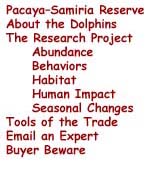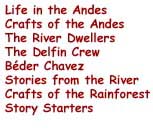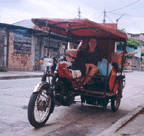 I
am very lucky Horacio is a good cook with lots of experience and knows
where to buy things in the market. It takes us all day to buy the food,
and we must go from shop to shop. There isnÕt a big grocery store here.
It is very hot, and the smells of the market are very strong. I am glad
when we are finished! I have to buy a few more things for the boat to
make it more comfortable for people to live on. I buy things like mosquito
nets, pillows, chairs, stools, and plates and silverware.
I
am very lucky Horacio is a good cook with lots of experience and knows
where to buy things in the market. It takes us all day to buy the food,
and we must go from shop to shop. There isnÕt a big grocery store here.
It is very hot, and the smells of the market are very strong. I am glad
when we are finished! I have to buy a few more things for the boat to
make it more comfortable for people to live on. I buy things like mosquito
nets, pillows, chairs, stools, and plates and silverware.
Once I buy everything in the market, I must bring it to the boat using
the local transportation, called a motocar-- it is a modified motorcycle
with a passenger seat. They are fast and fun to take around town, but
they are very noisy too. It is amazing to me that the driver has room
for me and all of my things!
January 23, 2000 
My first team of four volunteers has arrived, and I am relieved to
meet them and to find that they are all very nice people. They are all
very happy to be here with me to help study the dolphins. We met in
Iquitos, then boarded the boat and started traveling to the Pacaya-Samiria
Reserve.
To my relief, the volunteers laugh and tell jokes and get along very
well with each other and the crew. They have lots of questions for me
about the dolphins, and they are ready to begin work. We discuss what
life will be like on the boat for the next few weeks, then we discus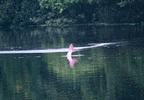 s
the research and the methods that we will be using to study the dolphins.
s
the research and the methods that we will be using to study the dolphins.
By late afternoon, we are seeing and counting dolphins! During the
two weeks in the Reserve, we observe many dolphins of the two river
dolphin species, boto and tucuxi. Some of our results will be posted
in a different part of this web site, so you can read about our results.
One day we see a bright pink boto slapping its tail on the surface of
the water. Everyone is very surprised to see this, and it makes a loud
noise as the tail strikes the water. I am not sure why the dolphin is
doing this. Sometimes dolphins slap their tails when they are mad. This
dolphin might also just be playing.
One of my volunteers buys me a surprise -- a dugout canoe from one of the local
villages! Now I 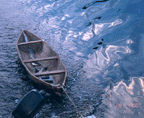 can
paddle out to watch the dolphins without the noise of the engine of
the big boat. The canoe is fun to paddle, but difficult to balance.
It will take lots of practice. The first time I try it I almost fall
into the water. The local children learn how to paddle canoes when they
are very young. Some paddle their own canoes when they are only five
or six years old!
can
paddle out to watch the dolphins without the noise of the engine of
the big boat. The canoe is fun to paddle, but difficult to balance.
It will take lots of practice. The first time I try it I almost fall
into the water. The local children learn how to paddle canoes when they
are very young. Some paddle their own canoes when they are only five
or six years old!
This first trip with volunteers has been a success. We spent a lot
of time in doing research, but we had fun too, and made some new friends.
I hope the rest of the year is this good!
Back to top
February 7, 2000
This week I am back in Iquitos. I am tired from the research trip,
and there is a lot of work to do. My crew and I have to clean all of
the equipment from the last trip, clean the boat, organize all of the
data and photographs, and get ready for the next trip in one week.
I ate something bad when I was in Iquitos and am sick for a few days.
I am worried things wonÕt be ready in time for the next trip. I have
so much to do, but am so tired and just want to sleep. I am lucky that
I have friends in Iquitos that help take care of me and the crew helps
to get things ready for the next trip.
The captain of the boat quit his job this week suddenly. He says his
family is having problems at home and they need him to help them around
the house and not be traveling on the river. Now I have only a few days
to find a new captain. What will I do? Luckily, I find a good new captain,
and a good first mate to help him run the ship. The boat is cleaned,
the equipment organized, the food and drinking water has been bought
and we are ready to go again. I am feeling better, but still feel tired.
February 14, 2000
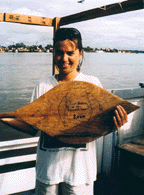 Team
two arrives. It is an all woman team! We laugh and call ourselves the
Ladies' Dolphin Watching Society. One day we were all watching dolphins
and recording their behavior, and I noticed we were all fanning ourselves
in the heat. It reminded me of an old-fashioned ladiesÕ club for sewing
or playing cards, except that we were all conducting scientific research.
Team
two arrives. It is an all woman team! We laugh and call ourselves the
Ladies' Dolphin Watching Society. One day we were all watching dolphins
and recording their behavior, and I noticed we were all fanning ourselves
in the heat. It reminded me of an old-fashioned ladiesÕ club for sewing
or playing cards, except that we were all conducting scientific research.
At the end of the trip, the volunteers present me with a paddle for
my canoe and the paddle has the names of the members of the team on
it. I am really happy with their present!
One day at one of the ranger stations in the Pacaya-Samiria
Reserve, we meet a group of students that are staying at the ranger
station. The students are from the University of the Peruvian Amazon,
which is in Iquitos. They are all studying biology. Along with a professor,
they are staying for one month in the Reserve to learn more about the
wildlife and plants found there. We invite them on the boat with us
one day, and they help us watch dolphins. We teach them more about our
research, and show them how to record 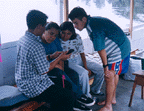 the
data on the data sheets and how to use the equipment.
the
data on the data sheets and how to use the equipment.
In this photo, my research assistant Geronimo Vega Quevare, is showing
the students how to operate the GPS. Ger—nimo is also a student at the
University in Iquitos. He is studying biology. He has very good eyes
and can spot a dolphin from a long way away. He and I communicate in
Spanish. He is learning English. He helps me with my Spanish and I help
him with English. He speaks another language as well, called Bora. He
is a member of the Bora ethnic group and is from near the Peruvian/Colombian/Brazilian
border. He plans to be head of the Reserve one day and I think he will
be good at it!
Back to Top
February 21, 2000 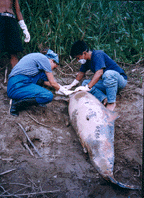
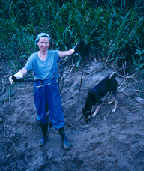 Today
is a sad day. We find the body of a tucuxi that died from drowning in
a net. The net was set by poachers who were trying to illegally trap
an aquatic turtle. People like to eat the turtles, especially in soup.
This net caught a dolphin instead. Even though we are all sad about
the dolphin, there is much to be learned from studying the dolphin.
Today
is a sad day. We find the body of a tucuxi that died from drowning in
a net. The net was set by poachers who were trying to illegally trap
an aquatic turtle. People like to eat the turtles, especially in soup.
This net caught a dolphin instead. Even though we are all sad about
the dolphin, there is much to be learned from studying the dolphin.
We move the body to shore, and Geronimo, the captain, the ranger, and
I investigate the dolphin. The smell is terrible and we have to wear
gloves to keep our hands clean. We measure its length, width, count
its teeth, and try to determine what sex it is. Sometimes this last
part is impossible, as the piranhas eat away at the body. This dolphin
was very large for a tucuxi-- the largest one I have ever seen.
We leave the body with the ranger, as he wants to save the bones and
skull to study them more. When we go back to Iquitos we tell the head
of the Reserve about the dead dolphin and how it was killed illegally.
He is sad to hear the news and says he will look into the situation.
February 28, 2000
Another busy week of cleaning up after one trip and preparing for the
next. It also seems the boat is in bad shape and will need to have some
repairs made to it so that it will be safe to travel on. Wood rots very
quickly here in the tropical heat. The Amazon River is very big and
powerful and we have to respect it. We just canÕt be too careful. Any
boat problems and everyoneÕs lives could be in danger.
It is raining a lot and the river is rising, so the current is very
strong and there are many logs in the river that could put a hole in
a weak boat. The boat builders come to the boat and make repairs all
week. They say the boat is safe now but that it will need major repairs
in April if we are to continue using it until the end of the year. I
love my work and studying the dolphins, but sometimes I have a lot of
other things to worry about!
March 6, 2000
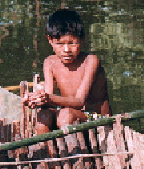 Team
three arrives. There are only three volunteers on this team. There is
also another researcher on this trip. He is a dolphin researcher that
has worked in South Africa, the United States, and in the Pacific Ocean.
He is here to help with the research and also to see river dolphins
for the first time. He is really surprised at how difficult they are
to study, since we do not get to see very much of them in the dark water.
He has some good ideas about how to study their behavior, and we all
enjoy listening to his stories about marine dolphins. He and I agree
it is good that we each got to learn something more about different
types of dolphins.
Team
three arrives. There are only three volunteers on this team. There is
also another researcher on this trip. He is a dolphin researcher that
has worked in South Africa, the United States, and in the Pacific Ocean.
He is here to help with the research and also to see river dolphins
for the first time. He is really surprised at how difficult they are
to study, since we do not get to see very much of them in the dark water.
He has some good ideas about how to study their behavior, and we all
enjoy listening to his stories about marine dolphins. He and I agree
it is good that we each got to learn something more about different
types of dolphins.
We visit the lake of San Pablo de Tipishca. I worry about the future
of this lake because there are so many fishermen there these  days.
They are catching a lot of fish which they take to Iquitos to sell.
I worry that soon there wonÕt be enough fish left for the dolphins,
the birds, and the local people. It seems everyone here eats fish!
days.
They are catching a lot of fish which they take to Iquitos to sell.
I worry that soon there wonÕt be enough fish left for the dolphins,
the birds, and the local people. It seems everyone here eats fish!
We meet a little boy who helps his father with the fishing. While his
father catches fish in nets, the little boy guards the fish cage where
they store the fish (photo 12). The little boy works all day in the
hot sun and seems a little nervous to see a boat full of strange looking
foreigners. We see many camps around the lake where people live temporarily
while they are fishing in the lake. They cut down lots of trees, and
hunt wildlife in order to eat something besides fish. Local people are
allowed to fish for their food in the Reserve, but outsiders are not
supposed to come in to hunt or fish. It makes me sad to see so many
camps of outsiders.
March 20, 2000 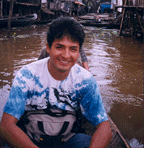
Another busy week. I am sick again. I think it is from being tired
and worried and also there are many strange diseases in the tropics.
This week classes are supposed to start up again at the University so
Ger—nimo will not be able to join me on the next research trip. Summer
vacation in Peru is from January until late March, which is summer below
the equator.
While Ger—nimo is in school for the next few months, I will be helped
by another researcher, Enzo Aliaga Rossel. Enzo is a biologist from
Bolivia, and has studied botos in his country for several years. He
will help me with my research and will also compare the habitat and
river dolphins of Peru to what he has seen in Bolivia. Enzo speaks Spanish
and English.
Back to Top
March 27, 2000
Team four of volunteers -- this is a very international team. We have
volunteers from England, New Zealand, and the USA, as well as the Peruvian
crew and 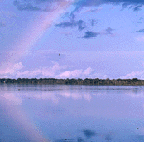 American
and Bolivian researchers. We all get along really well, even though
we donÕt all speak the same language. Even those that speak the same
language often have problems understanding each otherÕs accents and
expressions!
American
and Bolivian researchers. We all get along really well, even though
we donÕt all speak the same language. Even those that speak the same
language often have problems understanding each otherÕs accents and
expressions!
We see a lot of dolphins on this trip, in spite of all of the rain
and the mosquitoes. It is the height of the rainy season right now,
and we have had a lot of rain. The good thing about the rain though
is the beautiful rainbows that we see. The bad things about the rain
are that we lose some research time, there are a lot of mosquitoes,
our clothes take along time to dry, and things like books and papers
and the wood on the boat mold very quickly. We also find out the boatÕs
roof leaks very badly and all of our beds get wet one night! The crew
does their best to fix the leaks, but the boat builders will have to
repair the roof now as well as the hull of the boat when we are back
in port.
We meet the family of one of the rangers. He is working as a ranger
to support his wife and six children. He misses his family very much
as he must work for two and a half months by himself at the ranger station
and only gets a week off to go visit his family  before
he must be back at work. He does not have a telephone or two-way radio
and is usually by himself. We visited his family in their house in another
village in the Reserve and gave them a letter from the ranger. He said
he missed them and would try to come home soon.
before
he must be back at work. He does not have a telephone or two-way radio
and is usually by himself. We visited his family in their house in another
village in the Reserve and gave them a letter from the ranger. He said
he missed them and would try to come home soon.
We took pictures of the family to give to the ranger so that he could
see their faces and know they are doing well. We had hoped this 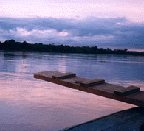 would
cheer him up, but the older girls kept crying because they missed their
father, so the photos made him sad and happy at the same time. The ranger
told us how difficult his and the other rangersÕ jobs are and we all
wish we could help them.
would
cheer him up, but the older girls kept crying because they missed their
father, so the photos made him sad and happy at the same time. The ranger
told us how difficult his and the other rangersÕ jobs are and we all
wish we could help them.
This is the last trip I will have until May. I will go to the USA for
a short visit with my family. During this time the boat builders will
pull the boat out of the water and make the major repairs that need
to be made. Enzo will stay in Peru to help supervise the work. Peru
has its presidential elections on April 9, and some people worry that
there may be some violence and protests. I am glad that I do not have
a new group of volunteers that are coming right now as it might be difficult
to travel. I will return to Peru May 6, and my next group of volunteers
arrives May 13. I am looking forward to a rest, but then I am really
looking forward to being back on the river, studying the dolphins again.
This is the view from my bedroom window on the boat. I think it is
the best view in the world! I will think of it often while I am away.
Click here for more
of Tamara's journal entries.




